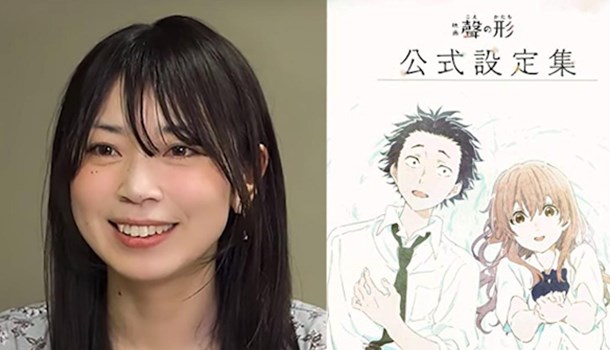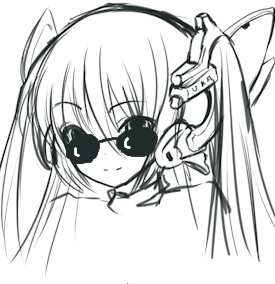
Written by on 13 Mar 2017
Ever since the runaway success of The Melancholy of Haruhi Suzumiya in 2006, Kyoto Animation has been seen as the flagship for some of the highest quality TV anime you're likely to find, while recent years have also seen them making impressive in-roads into the growing world of theatrical anime.
While the studio's recognisable visual style is a big part of their success, there's far more to the studio's output than top-notch animation. Nowhere is this more evident than in the work of director Naoko Yamada, who has rapidly risen through the ranks from animator to director, cutting her teeth on K-ON before moving onwards and upwards to become a celebrated industry figure for her lively, character-centric style.
Prior to the full UK theatrical release of her latest work, adapting acclaimed manga series A Silent Voice, we sat down with the film's remarkable director to talk about the movie and her illustrious career to date.
First of all, welcome back to the UK and thank you ever so much for taking the time to talk to us.
Naoko Yamada: Thank you very much!
To start at the beginning, how did you come to work in the anime industry, and was it something you always wanted to do?
Naoko Yamada: I've always liked animation, and TV anime was something I was very familiar with from when I was younger. I also loved movies and creating things, which is why I moved into this industry. Also, Kyoto Animation is based in Kyoto and not in Tokyo, so that appealed to me.
Once you started at Kyoto Animation, you made a quick progression from in-betweens to working on key animation within the studio - was that a daunting progression to make?
Naoko Yamada: It went fast! It wasn't daunting as I was actually having fun, but the time just went quickly.
From your time as a key animator, was there anything in particular that you really enjoyed drawing and animating? Or is there any scene that you worked on as an animator that really sticks in your mind?
Naoko Yamada: In The Melancholy of Haruhi Suzumiya, there's a story arc called Live Alive and there's a concert scene in it. Normally we animate at 24 frames per second in animation, but we had to use 30 frames per second like a live-action TV series for that sequence. That was hard work, but it's a scene I'm proud to remember.
What lessons as an animator would you say you brought with you when you started working as a director?
Naoko Yamada: The importance of motion and actions of people. I've always wanted to create characters that yes, are animated, but I want the audience to think they are real people - how they look at things, or small, subtle movements, and the physicality and weight of the characters.
I studied human motions - how real people move and how they actually look on-screen - and I wanted to transfer that to the screen as animation. That's what I brought from my experience as a key animator, and as a director I'm still conscious of that.
Looking back to the first full series you directed in the first season of K-ON, how do you feel about that experience now? What lessons have you learned from that time?
Naoko Yamada: Yukiko Horiguchi was the character designer for K-ON, and she said that the most important thing is "love" - love for the work and love for the characters. If you love the work and characters, you don't need anything else, and that's what I learned while working on K-ON.
Would you say your style of direction has changed since then?
Naoko Yamada: I don't think my style has changed, but it's more like I've progressed while still keeping the same aspects to my work that I've always had. I still want characters to be looked at like real people, and when I direct I think about the camera lens as if I'm shooting live-action movies - a sense of realism if you like. So yes, I have progressed, but I think fundamentally my style hasn't really changed that much.
Moving on to A Silent Voice, I think it's fair to say that it's fundamentally a very different story to something like K-ON or Tamako Market - did you approach directing the film differently as a result?
Naoko Yamada: The main theme is pretty much the same in anything, whether it's Tamako Market, K-ON or A Silent Voice - it's about human spirit and emotions. But I think with A Silent Voice I'm dealing even more with emotions, so it may feel more visceral if you like. I wanted to create a movie that would provoke senses in the audience, not just emotions.
How do you find the process of directing a film compared to a TV series? Are there any unique challenges to directing a film?
Naoko Yamada: They're both fun, but the kind of fun is a bit different. With television, each episode has its own team, so I work with different teams to ultimately make a bigger picture, whereas with a feature film the same team works on it from the beginning to the end and we are making one big picture. They're both fun, but slightly different, so the fun aspects are different.
What was your relationship with the source material for the film - had you read the manga before being attached to directing the movie?
Naoko Yamada: Everybody in the studio was talking about it as a great manga and how I must read it, but I sort of knew that if I read it I would want to direct it. So, I didn't read it until I actually got the offer to direct the film, and just wished for it to come true!
What were your first thoughts on reading the source manga - was there anything you latched onto that you most wanted to convey in the film?
Naoko Yamada: This film is about human kindness, and obviously the manga's story deals with this very deep theme and it's quite sensational in a way. But, I think that's just a small part of the whole story. Basically, what the story is saying is "I want to understand the other person" and "I want to be understood"; I want to say "I love you", and I want the other person to say "I love you" to me. It's about those raw, fundamental human emotions that are really important, and I wanted to convey all of this in the film - it's all prominent in the manga and I didn't want to make it any less important than the disability or the bullying in the story.
With so many characters in the manga seemingly having important stories to tell, was it difficult deciding where to keep your focus for this film adaptation in terms of what to keep in and what to leave out?
Naoko Yamada: Yes, a lot really had to go. It was like losing my limbs, because the original work is great and all of the characters are fantastic, but fundamentally the story is about Shouya so I really had to focus on him and really couldn't lose that. As a director, I was constantly aware that I couldn't shift my focus away from him, so a lot had to go but I think I was able to compensate by creating a very, very good character in Shouya I hope.
One thing that stood out to us particularly was the voice acting for Shouko, the main female character, and how that voice acting pertains to her disability. Was that something you had any particular input on?
Naoko Yamada: I didn't really go into any detail - I told the voice actress Saori Hayama what Shouko Nishimiya is like, what's important to her, how she acts on the surface and what she's actually feeling inside. We also had a real deaf person to train the voice actress, but Saori Hayama didn't really copy her and chose to interpret how the character is feeling and adapted from there. We wanted to create a character who is more attractive as a person in Shouko.
The film starts with a montage set to The Who's My Generation - what made you choose that song specifically to kick off the movie?
Naoko Yamada: Everybody all around the world probably knows this song, and the sound director Mr. Tsuruoka said that he wanted to use something evergreen that everybody can relate to.
Shouya as a boy - whether he's aware of it or not - feels like he's invincible but he's also really bored and frustrated. I wanted to describe his emotions - his boredom, his frustration, his rebellious teenage feelings - and I felt like this song contains all of that, which I chose that song.
That's all we have time for, so to close things out do you have a final message for fans of your work, and to anyone going to watch A Silent Voice?
Naoko Yamada: Hello everybody! I believe and hope that this film can appeal to a broad audience. It's about human emotions, and everybody has that small feeling of weakness somewhere and you always hope that nobody might see it. I really want the audience to feel that, and for people to feel as happy as Shouya will be eventually.
Thank you very much, it's been a pleasure talking to you.
Naoko Yamada: Thank you.
A Silent Voice arrives in UK cinemas nationwide on Wednesday, 15th March 2017 - you can find screenings and book tickets on the official web site.

posted by Ross Liversidge on 11 Apr 2025
posted by Ross Liversidge on 08 Apr 2025
posted by Ross Liversidge on 26 Mar 2025
posted by on 21 Mar 2025
posted by Ross Liversidge on 21 Mar 2025
posted by on 10 Mar 2025
posted by Ross Liversidge on 04 Mar 2025